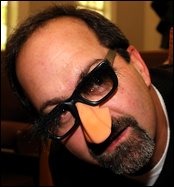A quick note to any person who ever felt compelled to answer one of Douglas Wilson’s misrepresentations: DON’T. Do not answer him because it’s not worth your time. This is all a game for him.
It goes like this: he gets to put words in your mouth, impute evil motives to you, and generally make you look like an incompetent boob, while he acts as pure as the wind-driven snow. Wilson creates handles for him to grab in these situations, so that he can hook you. And misrepresentation is his most effective method for creating a handle. He misrepresents you knowing that you’ll want to respond — to correct him — and then he’s got you. He’ll start swinging you round the room with those handles, and just when you think it’s corrected, he’ll misrepresent you again to keep it going. IT IS ALL A GAME FOR HIM, as long as he remains the center of attention and you keep coming back for more.
Take my blog, for example. He refuses to address the content here, choosing instead to hold the handles of an “anonymous attack blog.” He completely ignores the heavy documentation on this blog and keeps pounding his ridiculous mantra “anonymous attack blog.”
But if I identified myself, he would immediately ad hom me, and then attack my family and my friends, to silence me. Further, he would dispatch an attack squad of monkey boys to my place of employment to harass them into silencing me, and he would send intimidating emails to my family, intending to scare the hell out of them. He has done this to countless souls on the Palouse, as well as a few people elsewhere. I have documented these facts on this blog, which he ignores because he has his self-made handle that won’t let go: “anonymous attack blog.”
So the moral of this story is to ignore him — no matter what he says. He is an evil, vindictive, conniving son of Belial (SOB), who does the will of his father. And the sooner the Catholic church learns this lesson, the sooner we will remedy all the turmoil he has caused.
Now, I want thank Mr. Wilson for sending me lots of new readers. To those of you who are new, I urge you to read the following two posts if you want to know what Wilson really thinks of presbyterian polity: “The Worst Lot of All” and “Snakes Within the Covenant.”
Thank you.
 “If you want to read an indictment of American academia, as if you needed one, then I recommend Plagiarism and the Culture War. In it, Theodore Pappas documents the wholesale plagiarism committed by Martin Luther King, Jr. in his doctoral work, not to mention the varied and wondrous contortions of the academic establishment as they sought to studiously ignore this indisputable fact. Of course, this particular instance is not the sum and substance of modern academic corruption, but it does provide a wonderful example of how it all works. If you are in any doubt about how advanced our public corruption is, just write a letter to your local paper on how MLK was a plagiarist, and see what happens. Suddenly, mirabile dictu, people like you who believe that a man should be judged by the content of his character and not by the color of his skin will be branded . . . racists. George Orwell, call your office.” (Douglas Wilson, Credenda Agenda, 11-1)
“If you want to read an indictment of American academia, as if you needed one, then I recommend Plagiarism and the Culture War. In it, Theodore Pappas documents the wholesale plagiarism committed by Martin Luther King, Jr. in his doctoral work, not to mention the varied and wondrous contortions of the academic establishment as they sought to studiously ignore this indisputable fact. Of course, this particular instance is not the sum and substance of modern academic corruption, but it does provide a wonderful example of how it all works. If you are in any doubt about how advanced our public corruption is, just write a letter to your local paper on how MLK was a plagiarist, and see what happens. Suddenly, mirabile dictu, people like you who believe that a man should be judged by the content of his character and not by the color of his skin will be branded . . . racists. George Orwell, call your office.” (Douglas Wilson, Credenda Agenda, 11-1)






























